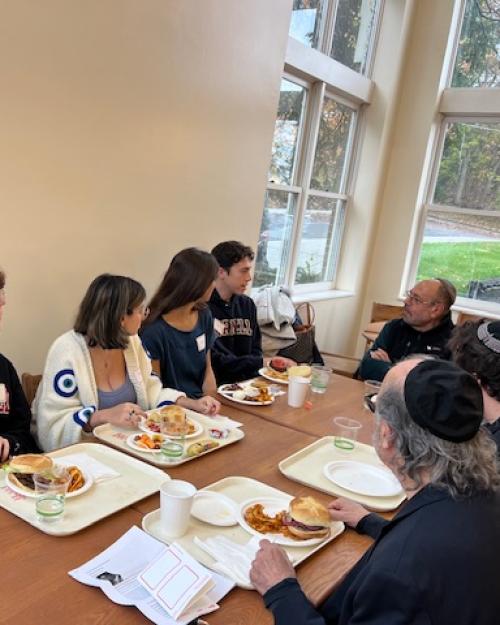Anti-Semitism and the Making of European Jewry (JWST 2156)
TR 8:40-9:55am, 4 credits
Does hatred have a history? Historians insist that Europe invented a tradition of hating Jews and Judaism; some go so far as to argue that the destruction of European Jewry during the Holocaust was the culmination of a thousand-year-old prejudice against Jewish difference, cultivated not only by cranks and lunatics at the margins of European discourse, but by great luminaries with a reputation for progressive, even radical, opinions. In fact, the cultural problem of Jewish difference was implicated in both the destruction and the creation of European Jewry. In this seminar, we will examine exemplary works of Europe's famous anti-Jewish canon — such as Paul's letter to the Romans, Luther's "On the Jews and their Lies," and Marx's "On the Jewish Question" — in order to contextualize a mythology of Jewish "otherness" that enflamed the anti-Jewish imagination even when there were few Jewish "others" around to hate. We will also look at critical moments in Jewish history marked by the appropriation of anti-Jewish arguments in the name of Jewish social discipline and moral authority. Through the prism of provocative Jewish texts such as the Crusade chronicles, Mendelssohn's Jerusalem and Pinsker's "Auto-emancipation" we will explore some of the ways in which the "enabling violation" of anti-semitism both constrained Jewish existence and liberated Jewish self-consciousness, turning Europe into a home for Judaism as well as a Jewish "hell on earth."
The Jewish Life of DNA (JWST 3719)
TR 11:40-12:55pm, 4 credits
Cara Rock-Singer
This course will explore the relationship between DNA and Jewish life. We will conceive of Jews and Judaism broadly, in terms of religious, ethnic, and national discourses as we consider theories of kinship and nationalism, definitions of ethnicity and race, the "molecularization" of human life, the use of DNA as a spiritual metaphor, the ethics of "playing God" through biomedicine, and imaginations of utopian and dystopian futures. The entangled social, political, economic, legal, metaphorical, and theological questions that DNA has raised during the twentieth century will serve as a lens to fundamental issues in Jewish Studies and Science and Technology Studies about the nature of Jewish identity and about the social and political elements of knowledge production, respectively. Our readings will combine scholarly texts with a range of primary sources, while our classroom discussions will include guest lectures by scholars from Molecular Biology and other relevant fields to discuss the religious and social implications of their research.
Messiah and Modernity (JWST 4473)
T 2:30-4:25pm, 4 credits
This course combines Jewish religious history with studies in the philosophy of modernity, focusing on changing conceptions of time and history. We will interrogate possible or implicit connections between traditional Jewish notions of Messianic redemption on one hand, and post-Enlightenment conceptions of revolution and progress on the other (always bearing in mind that the dominant Christian ideology in the West also has Messianic content). Some readings will provide historical background on Jewish Messianism. We will explore aspects of the intellectual dialogue between Walter Benjamin, a leading European thinker on literature and the philosophy of history in the first decades of the twentieth century, and his lifelong friend Gershom Scholem, founder of the scholarly study of Jewish mysticism. We will continue by considering how post-World War II thinkers, especially on the Continent, have responded to the critique of modern ideologies of progress inaugurated by Benjamin and his friends in the so-called "Frankfurt School."
The Lower East Side: Jews and the Immigrant City (JWST 4533)
T 2:30-4:25pm, 4 credits
American Jews have frequently been touted as a "model minority." This course will take a more critical look at the historical interactions between Jewish immigration, United States industrialization, and processes of social and geographical mobility—all through the prism of New York's Lower East Side, first home for over 750,000 Jewish immigrants from Central and Eastern Europe, the Ottoman Empire and elsewhere between the mid-19th century and the 1920s. We will compare the Jewish experience to that of other immigrants/migrants by considering social institutions as well as material and other cultural practices. We will examine interactions with the built environment —most especially the tenement—in Lower East Side culture. Special attention will be paid to immigrant labor movement politics including strikes, splits, and gender in the garment trade. From the perspective of the present, the course will examine how commemoration, heritage tourism and the selling of [immigrant] history intersect with gentrifying real estate in an "iconic" New York City neighborhood. Projects using the ILR's archives on the Triangle Fire and other topics are explicitly encouraged. This course counts as an out of college elective for B. Arch and M. Arch students.





